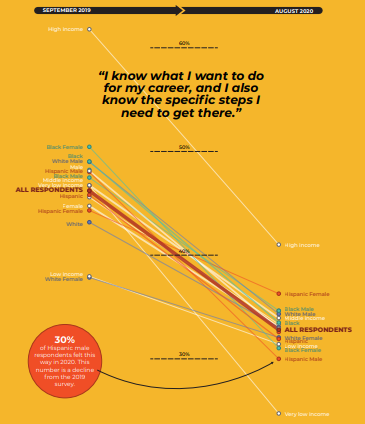This post offers reflections from Advance CTE staff on key equity themes from our 2021 Spring Meeting. Visit Advance CTE’s Resource Center for additional resources on equity and access, career advisement and data and accountability.
Using Data to Identify and Close Opportunity Gaps in Career Technical Education (CTE) Advance Equity in CTE
This year marked my fourth Advance CTE Spring Meeting, but it was not a typical spring meeting by any means. The backdrop of the COVID-19 (coronavirus) pandemic was present throughout, not just in the technology and virtual set up, but also in the conversations and session topics. The past year has thrown into stark relief the inequities across race, ethnicity, gender identity and socioeconomic status that have long been present in CTE. From the plenary panels down to breakout sessions and networking discussions, the question on top of everyone’s mind was how can we improve equity in CTE during and beyond the pandemic?
I had the pleasure of partnering with Jeralyn Jargo and Robb Lowe from the Minnesota State Colleges and Universities system office on a presentation about data and equity in CTE. Last year, Advance CTE worked with Minnesota to develop and conduct a multi-part workshop with consortium leaders — who represent both secondary and postsecondary CTE — to identify and act on opportunity gaps in their data. We worked with consortium leaders to develop data dashboards, conduct a root cause analysis, and review and select evidence-based strategies for action. As a result of the workshops, one consortium is now working on a pilot program to recruit Black men into the teaching profession, targeting a critical shortage of diverse educators. Later this year, Advance CTE plans to roll out the workshop training to its broader membership to help CTE leaders understand how to identify and address opportunity gaps in their own data.
Austin Estes, Data and Research Manager
Brave Dialogues for Equity in CTE
As someone driven by equity in education, I was very excited that my first Advance CTE Spring Meeting was focused on equity in CTE. I had the opportunity to lead a workshop on facilitating brave dialogues in CTE. Brave dialogues encourage participants to be courageous and show vulnerability to engage in conversations focused on race and racism. These conversations are always important, but even more so today considering that issues related to systemic racism have dominated the national discourse over the past year. Within CTE, state leaders are anxious to address opportunity gaps that have long persisted in CTE along with tackling stigmas associated with CTE given its history of tracking marginalized learner groups into low-quality vocational programs. To address opportunity gaps and CTE stigmas, state leaders need to create the space for brave dialogues.
In the equity workshop, state CTE leaders shared challenges to engaging in brave dialogues within their state. Some common challenges include a hesitancy to acknowledge or confront CTE’s history with systemic racism or not having the language or resources to confidently speak about the challenges facing historically marginalized learners. In other cases, leaders are engaging in these conversations but are unsure of what actions to take in order to address equity related challenges. To support state CTE leaders, Advance CTE is developing an equity discussion guide to support these conversations. Built around a critical self-reflection framework, the guide supports state CTE leaders in helping their staff and local practitioners in building awareness of their own values, assumptions and biases; knowledge of how learner identities can impact their experience in CTE programs; and skills to apply their awareness and knowledge into equitable policy and practice. The equity discussion guide, due to be released in early summer 2021, will be accompanied by training workshops to support state CTE leaders in facilitating these brave dialogues.
Brian Robinson, Policy Associate
Leading with an equity lens
This year was my first Advance CTE Spring Meeting and first ever virtual conference experience. This past year highlighted the inequities that continue to exist in CTE, education and workforce development and has left states with many questions about how to best increase equity in their CTE programs.
Many of the sessions at Spring Meeting had an emphasis on the importance of increasing equity in CTE. My session, Leading with an equity lens, specifically went into depth about this topic and how to apply an equity lens so that all state CTE decisions, policies and practices attend to the individualized needs of learners and tackle systemic and institutional barriers to success.
This session featured Jacque Treaster, Director of Dual Enrollment and Career & Technical Education, Montana University System and Jennell Ives, Director of Secondary Postsecondary Transitions, Oregon Department of Education who led participants through their work to improve CTE data systems and examine state policies and practices to ensure learners of all ages, races, genders and abilities are positioned for lifelong success.
When asked to share their equity successes, states mentioned creating a diversity, equity & inclusion group at the state level to offer professional development to state department of education employees and schools; emphasizing equity in legislation as a driver while also addressing it in the CLNA applications; and using special populations data to drive program and funding decisions.
Despite these promising strategies, many equity challenges still remain for states, including challenges with hiring personnel representative of the learner population, how to best use data in decision-making and how to get others on board with seeing equity as an important state issue.
Next, Jacque spoke about Montana’s work with their data to try and break down where their American Indian, rural, and economically disadvantaged learners are taking postsecondary courses and which program areas they are most likely to enroll in to ensure these populations are entering high-wage, high-skill career pathways. They are hoping that by continuing to take a closer look at the data, they will be in a better position to figure out where to pool more resources for those students.
Jennell then presented on Oregon’s equity work and how the support from the Governor and other top agencies in the state to focus on antiracism in education has encouraged a focus on identifying inequities in their data and stakeholder feedback, collaborating directly with communities and learners impacted directly by CTE decisions and creating an internal review process to check their work for an equity and antiracism lens.
Although there is still much work to be done, hearing from these speakers about their state’s approaches to equity left the audience with tangible ideas to further incorporate equity into their own work and priorities.
Christina Koch, Policy Associate
Advancing Equity Through Research Initiatives
In my first year as an Advance CTE staff member, I was excited to hear from a wide range of experts and panelists in our first virtual spring meeting. Despite the modified format, each person celebrated the successes our community has achieved this past year and highlighted obstacles and barriers that we have acknowledged and worked through. Through each of the panels and presentations, I heard a common theme of ensuring equitable access and participation from minoritized and marginalized populations.
 One presentation I moderated was a conversation with state and local leaders based on Advance CTE research regarding the importance of area technical centers (ATCs)- CTE-focused, non-degree granting institutions that often bridge the gap between secondary and other postsecondary institutions. Our research illustrated the role that ATCs could play, especially in post-secondary attainment, upskilling and reskilling as largely open-access, low-cost program options. A significant portion of the conversation focused on the unique opportunity these institutions have of increasing access to CTE programming for all learners. Both speakers highlighted how their institutions work to improve outcomes for minoritized groups and celebrate the diverse perspectives that come with recruitment and retention of a variety of populations.
One presentation I moderated was a conversation with state and local leaders based on Advance CTE research regarding the importance of area technical centers (ATCs)- CTE-focused, non-degree granting institutions that often bridge the gap between secondary and other postsecondary institutions. Our research illustrated the role that ATCs could play, especially in post-secondary attainment, upskilling and reskilling as largely open-access, low-cost program options. A significant portion of the conversation focused on the unique opportunity these institutions have of increasing access to CTE programming for all learners. Both speakers highlighted how their institutions work to improve outcomes for minoritized groups and celebrate the diverse perspectives that come with recruitment and retention of a variety of populations.
Despite the research focus on equity for these institutions, and on equity in other sessions, it was also clear there is still work to be done. Each panelist I heard speak on equity offered challenges about centering equity as a key component of our work to ensure that each learner, regardless of race or background, can access CTE. For area technical centers, one particular challenge highlighted by speakers was the difficulty in recruitment and retention practices for marginalized groups. In future research initiatives, it is vital that we examine our data with an equity lens, asking probing questions about what it means for practices, policy, and programs to be equitable. We also plan to specifically feature best practices that elevate equity as a core component. While these steps will work towards our goal of highlighting diversity, equity, and inclusion in each of our research initiatives, it is vital we continue to have conversations, like those held regularly at our Spring Meeting, to ensure that equity is not just highlighted, but celebrated.
Dan Hinderliter, Policy Associate
Advancing Equity Through Career Advisement
At this year’s Spring Meeting, equity was explored through a variety of lenses. My session facilitated a conversation on our vision to empower students to navigate their career journey through career advisement, featuring panelists from the Washington State Workforce Board and the Arkansas Department of Education discussing best practices to provide dedicated supports to historically marginalized populations.
Sonja Wright-McMurray, the Senior Associate Director of the Division of Career and Technical Education (CTE) at the Arkansas Department of Education shared about one opportunity in Arkansas that aligned equity with career advisement systems, the College and Career Coach program. The College and Career Coach Component is designed to motivate and support Arkansas students and adults achieve their goals as it relates to college and career planning through intensive hands-on, programs and services. As part of the application process the state requires applicants to pay close attention or give “high priority” to students who are classified as “Special Populations”, as defined by the Strengthening Career and Technical Education for the 21st Century Act (Perkins V).
At the time the state was looking to launch their career coach program, Arkansas was also engaged in the development of a statewide partnership with the National Technical Assistance Center on Transition, which created collaborative relationships with agencies supporting special education, transition services and rehabilitation services. As a result, the state pushed all Career Coach programs to provide targeted services to students with disabilities as well as at least two other special population categories.
The insights shared by the panelists reinforce the importance of collaboration to address learner needs as well as strong accountability processes for local systems to document equity-focused reforms and processes.. As state leaders continue their work on aligning career advisement systems I am excited to see how they integrate equity throughout the continuum.
Jeran Culina, Senior Policy Associate
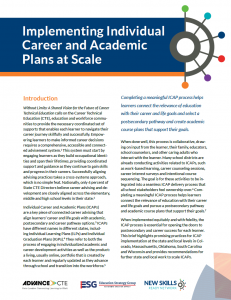


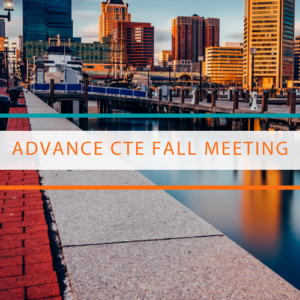 On October 27 and 28, over 270 state Career Technical Education (CTE) leaders gathered for Advance CTE’s 2021 Fall Meeting. Through timely plenary discussions, breakout and networking sessions, members and supporters were able to reflect on the transformations of the COVID-19 (coronavirus) pandemic, gain knowledge on the latest research and promising practices in states, and create community by building networks with leaders in similar roles.
On October 27 and 28, over 270 state Career Technical Education (CTE) leaders gathered for Advance CTE’s 2021 Fall Meeting. Through timely plenary discussions, breakout and networking sessions, members and supporters were able to reflect on the transformations of the COVID-19 (coronavirus) pandemic, gain knowledge on the latest research and promising practices in states, and create community by building networks with leaders in similar roles. 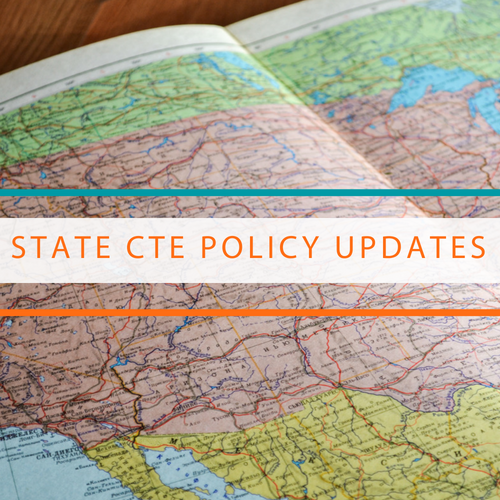 State leaders, particularly state legislators, have a unique role to play in ensuring equitable access to high-quality Career Technical Education (CTE). As the COVID-19 pandemic continues, access and technology gaps have been laid bare, revealing inequities in opportunities for marginalized learner populations. While
State leaders, particularly state legislators, have a unique role to play in ensuring equitable access to high-quality Career Technical Education (CTE). As the COVID-19 pandemic continues, access and technology gaps have been laid bare, revealing inequities in opportunities for marginalized learner populations. While 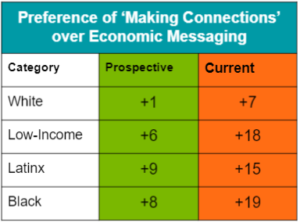 These findings have important implications for how CTE can close equity gaps, as well as what aspects of CTE should be elevated when conducting outreach to historically marginalized populations. Communications should be specific about the equitable opportunities provided through CTE to prepare for and jumpstart postsecondary education, as well as to gain visibility and networks through connections and hands-on experiences with like-minded educators, peers and employers .
These findings have important implications for how CTE can close equity gaps, as well as what aspects of CTE should be elevated when conducting outreach to historically marginalized populations. Communications should be specific about the equitable opportunities provided through CTE to prepare for and jumpstart postsecondary education, as well as to gain visibility and networks through connections and hands-on experiences with like-minded educators, peers and employers . 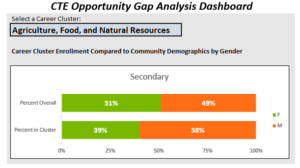 The CTE opportunity gap analysis training was piloted last summer in partnership with Minnesota State Colleges and Universities. Minnesota is organized into 26 consortia to implement the Strengthening Career and Technical Education for the 21st Century Act (Perkins V), each representing the community or technical college and school districts in their service area. Each consortium sent secondary and postsecondary representatives to the pilot workshop.
The CTE opportunity gap analysis training was piloted last summer in partnership with Minnesota State Colleges and Universities. Minnesota is organized into 26 consortia to implement the Strengthening Career and Technical Education for the 21st Century Act (Perkins V), each representing the community or technical college and school districts in their service area. Each consortium sent secondary and postsecondary representatives to the pilot workshop.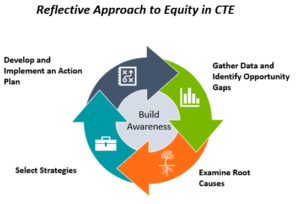 In the second session, participants reviewed their own dashboards — which they prepared in advance with data from the state office — in order to identify learner subgroups that were over- or under-represented across different CTE programs compared to the overall learner population. Participants used a fishbone diagram to identify and map underlying root causes and reviewed intervention strategies and supporting evidence to target recruitment, enrollment and inclusivity of diverse learner populations in CTE. Using this information, they began to develop equity-focused action plans. The workshop, which was aligned with Minnesota’s Perkins V professional development series, was designed to help participants center equity in their Perkins V applications and action plans.
In the second session, participants reviewed their own dashboards — which they prepared in advance with data from the state office — in order to identify learner subgroups that were over- or under-represented across different CTE programs compared to the overall learner population. Participants used a fishbone diagram to identify and map underlying root causes and reviewed intervention strategies and supporting evidence to target recruitment, enrollment and inclusivity of diverse learner populations in CTE. Using this information, they began to develop equity-focused action plans. The workshop, which was aligned with Minnesota’s Perkins V professional development series, was designed to help participants center equity in their Perkins V applications and action plans. One presentation I moderated was a conversation with state and local leaders based on Advance CTE research regarding the importance of
One presentation I moderated was a conversation with state and local leaders based on Advance CTE research regarding the importance of 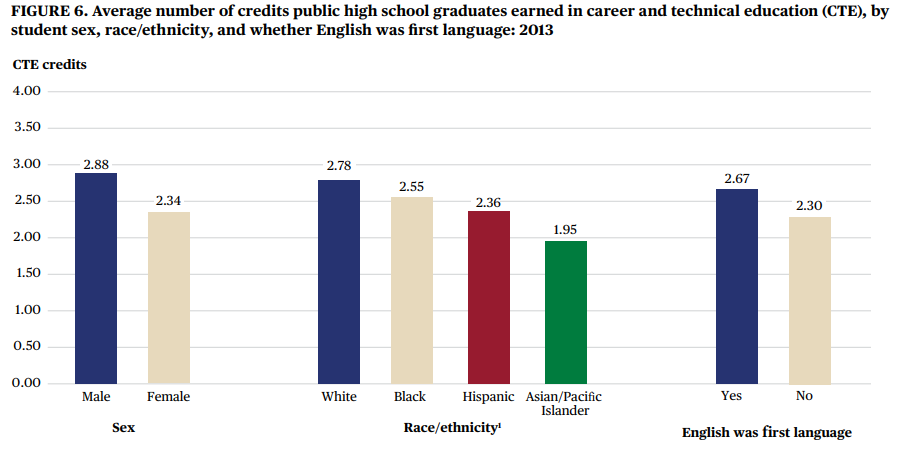
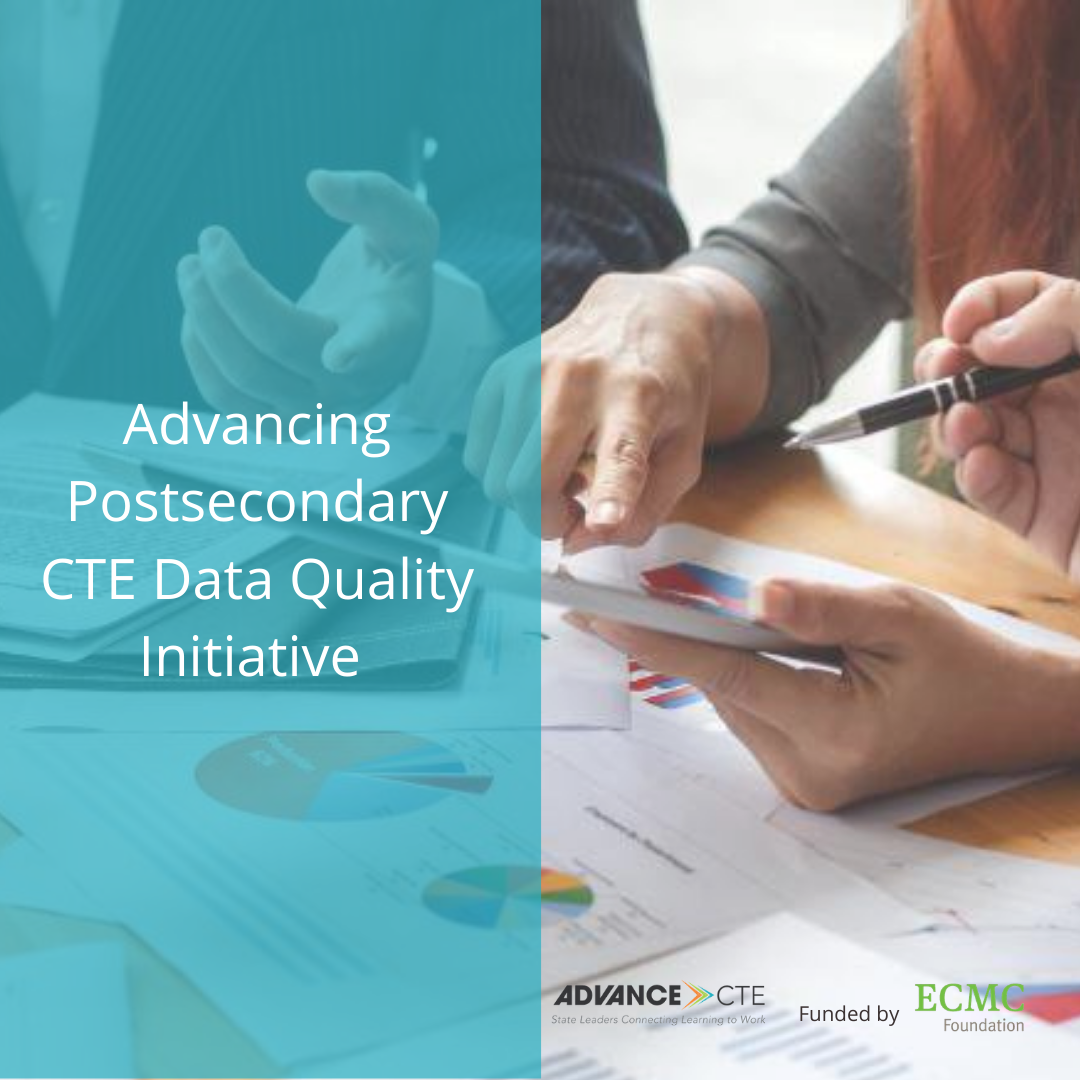 Advance CTE Announces New State-led Initiative
Advance CTE Announces New State-led Initiative